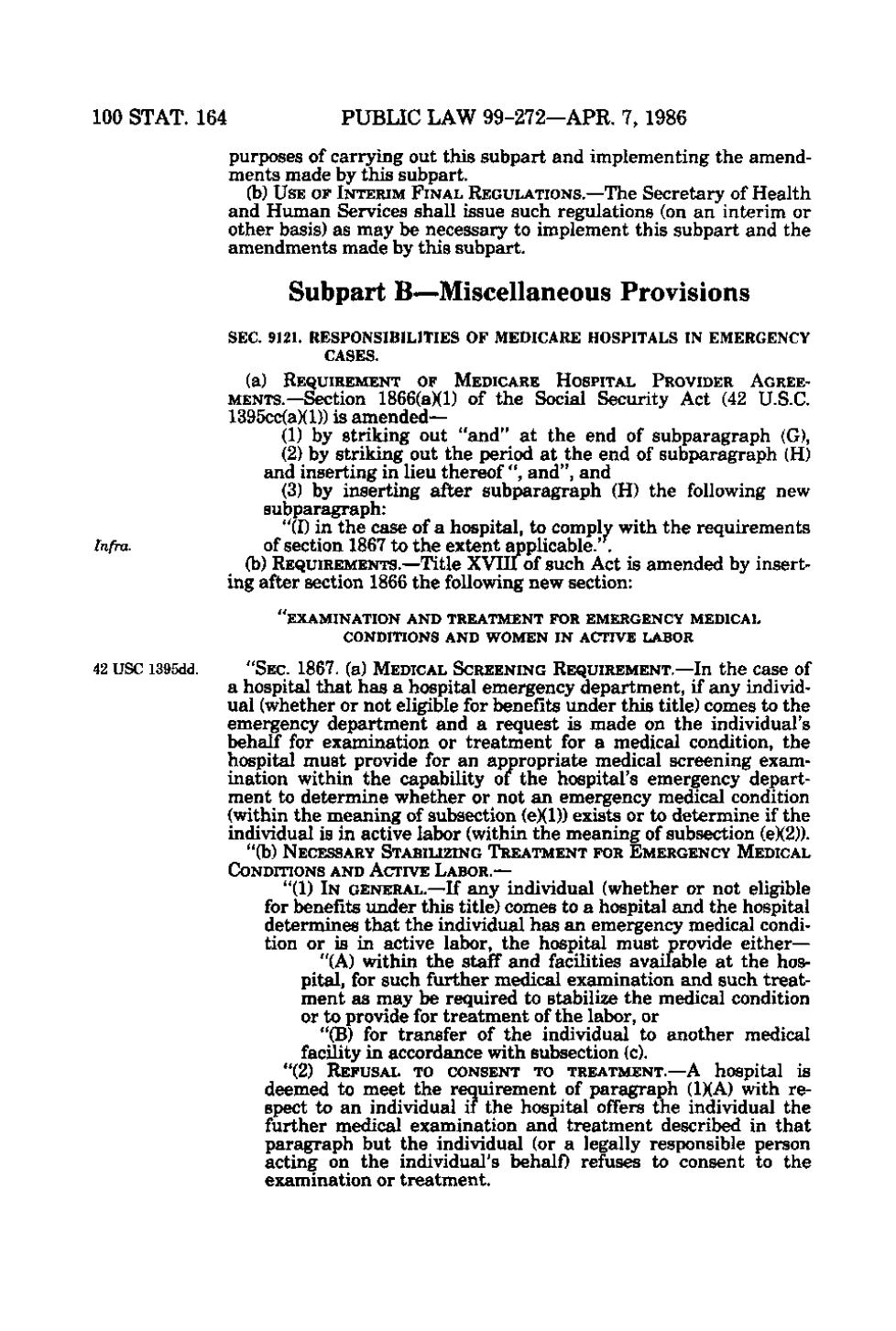100 STAT. 164
PUBLIC LAW 99-272—APR. 7, 1986 purposes of carrying out this subpart and implementing the amendments made by this subpart. (b) USE OF INTERIM FINAL REGULATIONS.—The Secretary of Health and Human Services shall issue such regulations (on an interim or other basis) as may be necessary to implement this subpart and the amendments made by this subpart.
Subpart B—Miscellaneous Provisions SEC. 9121. RESPONSIBILITIES OF MEDICARE HOSPITALS IN EMERGENCY CASES. (a)
Infra.
REQUIREMENT OF MEDICARE
HOSPITAL
PROVIDER AGREE-
MENTS.—Section 1866(a)(1) of the Social Security Act (42 U.S.C. 1395cc(a)(l)) is amended— (1) by striking out "and" at the end of subparagraph (G), (2) by striking out the period at the end of subparagraph (H) and inserting in lieu thereof ", and", and (3) by inserting after subparagraph (H) the following new subparagraph: "(I) in the case of a hospital, to complv with the requirements of section 1867 to the extent applicable.'. (b) REQUIREMENTS.—Title XVIII of such Act is amended by inserting after section 1866 the following new section: "EXAMINATION AND TREATMENT FOR EMERGENCY MEDICAL CONDITIONS AND WOMEN IN ACTIVE LABOR
42 USC I395dd.
1867. (a) MEDICAL SCREENING REQUIREMENT.—In the case of a hospital that has a hospital emergency department, if any individual (whether or not eligible for benefits under this title) comes to the emergency department and a request is made on the individual's behalf for examination or treatment for a medical condition, the hospital must provide for an appropriate medical screening examination within the capability of the hospital's emergency department to determine whether or not an emergency medical condition (within the meaning of subsection (e)(1)) exists or to determine if the individual is in active labor (within the meaning of subsection (e)(2)). "SEC.
"(b) NECESSARY STABILIZING TREATMENT FOR EMERGENCY MEDICAL CONDITIONS AND ACTIVE LABOR.—
"(1) IN GENERAL.—If any individual (whether or not eligible for benefits under this title) comes to a hospital and the hospital determines that the individual has an emergency medical condition or is in active labor, the hospital must provide either— "(A) within the staff and facilities available at the hospital, for such further medical examination and such treatment as may be required to stabilize the medical condition or to provide for treatment of the labor, or "(B) for transfer of the individual to another medical facility in accordance with subsection (c). "(2)
,^
REFUSAL TO CONSENT TO TREATMENT.—A hospital
is
deemed to meet the requirement of paragraph (1)(A) with respect to an individual if the hospital offers the individual the further medical examination and treatment described in that paragraph but the individual (or a legally responsible person acting on the individual's behalf) refuses to consent to the examination or treatment.
�
